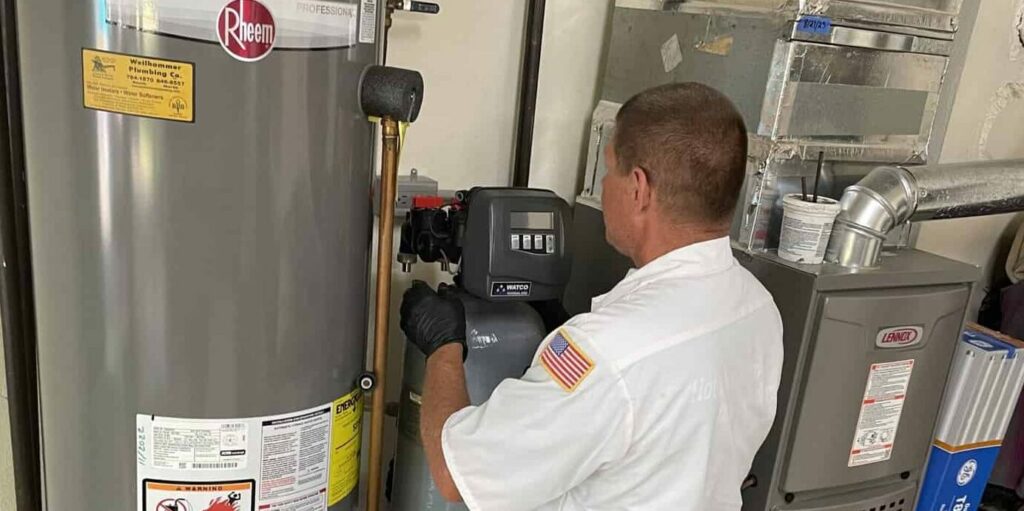In the ever-evolving landscape of home appliances, water softeners stand as unsung heroes, quietly combatting the adverse effects of hard water on plumbing and appliances. Among the contenders in this crucial arena, Rheem has etched its name with a promise of affordability, functionality, and household water quality improvement.
In this detailed Rheem Water Softener Reviews, we dive into the world of Rheem water softeners, scrutinizing their features, benefits, and potential considerations. Join us as we unravel the tapestry of Rheem’s offerings, guiding you through the waters of informed decision-making for your home.
Rheem Water Softeners Comparison Chart
Before making any decisions, it’s essential to understand the landscape. Here’s a quick glance at the Rheem water softener family:
| Model | Capacity (Grains) | Flow Rate (GPM) | Dimensions (inches) |
| Rheem Preferred | Up to 48,000 | 10 | 18 x 33 x 13 |
| Rheem Preferred Plus | Up to 48,000 | 11 | 19 x 45 x 13 |
| Rheem Preferred Platinum | Up to 64,000 | 12 | 22 x 49 x 13 |
| Rheem Preferred Compact | Up to 31,000 | 8 | 18 x 21 x 44 |
Rheem Water Softener Review
1. Rheem Preferred Water Softener
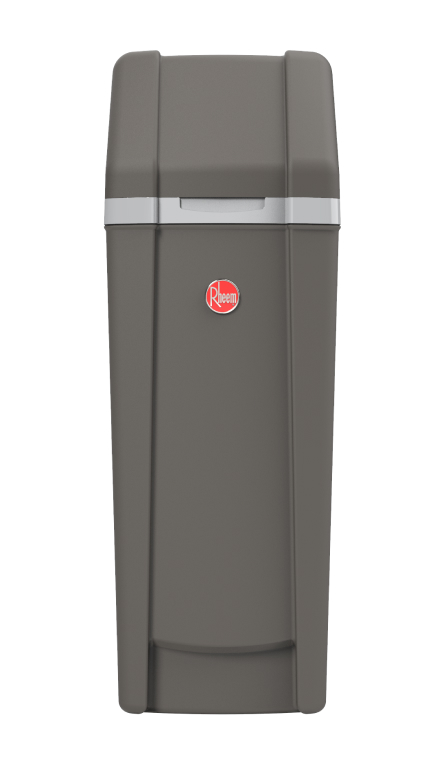
Rheem Preferred Water Softener is the entry-level solution in Rheem’s lineup, designed to tackle moderate hard water challenges.
The system is engineered for utilization within a flow rate of a minimum of 3 gallons per minute (GPM) and a water pressure spectrum ranging from 20 to 125 pounds per square inch (PSI).
Furthermore, it is supported by diverse warranty options, spanning durations from 1 to 10 years. Let’s take a closer look at its specifications, key features, pros, and cons.
Specifications:
Capacity (Grains): Up to 48,000
Flow Rate (GPM – Gallons Per Minute): 10
Dimensions (inches): 18 x 33 x 13
Key Features:
Efficient Softening: With a generous capacity of up to 48,000 grains, the Rheem Preferred effectively softens water, preventing the negative effects of hard water on appliances and plumbing.
Decent Flow Rate: The 10 GPM flow rate ensures a steady water supply of softened water, catering to the soft water demands of households with moderate water consumption.
Compact Design: The dimensions of 18 x 33 x 13 inches make it a space-efficient choice, suitable for homes where space is at a premium.
Pros:
Affordability: The Rheem Preferred Water Softener provides an affordable entry point for those looking to improve water quality without breaking the bank.
Ease of Installation: Its compact design not only saves space but also makes installation a breeze, even for those with minimal plumbing experience.
Programmable Settings: The softener comes with programmable settings, allowing users to customize regeneration cycles based on their specific water usage patterns.
Loading salt into the generously sized tank is a breeze: simply lift the hinged cover and pour it in effortlessly. Additionally, the unit ensures you never overlook salt replenishments, thanks to its low salt monitor. A flashing blue light serves as a reminder when the tank is in need of a refill.
Cons:
Limited Capacity: While suitable for moderate hard water issues, the 48,000-grain capacity might be insufficient for larger households facing more significant water hardness challenges.
Basic Display: The display interface is functional but lacks the sophistication found in higher-end models, providing essential information without additional frills.
Final Verdict:
The Rheem Preferred Water Softener is an excellent choice for budget-conscious consumers dealing with moderate hard water problems. Its compact design, efficient softening capabilities, and programmable settings make it a practical solution for smaller homes or apartments.
However, for those with larger households or more severe water hardness issues, exploring Rheem’s higher-tier models might be a more suitable investment.
2. Rheem Preferred Plus Water Softener
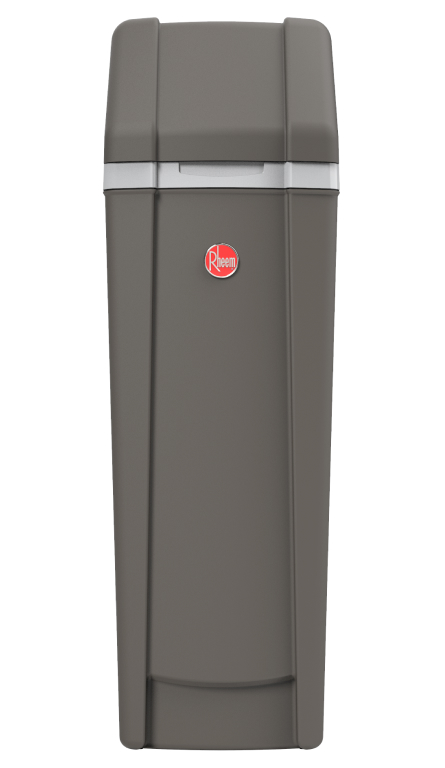
The Rheem Preferred Plus Water Softener is a step up from the entry-level model, offering enhanced features to meet the demands of larger households with increased water consumption. Let’s delve into its specifications, key features, pros, and cons.
Specifications:
Capacity (Grains): Up to 48,000
Flow Rate (GPM – Gallons Per Minute): 11
Dimensions (inches): 19 x 45 x 13
Key Features:
High Flow Rate: With a flow rate of 11 GPM, the Rheem Preferred Plus ensures a faster and more consistent supply of softened water, making it suitable for homes with higher water usage.
Same Impressive Capacity: Similar to its predecessor, it boasts a capacity of up to 48,000 grains, effectively addressing moderate to substantial hard water challenges.
Extended Dimensions: The larger dimensions of 19 x 45 x 13 inches accommodate the increased flow rate, providing a balanced solution for larger households.
Tailoring your water hardness level is made effortless through the system’s external blending valve, enabling you to enhance the softener’s efficiency and eradicate calcium and magnesium ions from your water. The softener excels in removing a notable 140 grains per gallon of hardness at its maximum capacity.
Pros:
Enhanced Performance: The higher flow rate makes the Preferred Plus a suitable choice for families with more significant water consumption, ensuring a continuous supply of softened water.
Moderate Price Increase: Despite the added features, the Preferred Plus remains competitively priced, offering a balance between performance and affordability.
Programmable Regeneration: Like the Preferred model, the Plus version allows users to program regeneration cycles, providing flexibility based on individual water usage patterns.
Cons:
Requires More Space: The larger dimensions may pose a challenge for homes with limited installation space, requiring careful consideration of placement.
Similar Display Limitations: The display interface remains functional but lacks the advanced features found in top-tier models.
Final Verdict:
The Rheem Preferred Plus Water Softener strikes a balance between affordability and enhanced performance. With a higher flow rate, it caters to the needs of larger households facing moderate to substantial hard water issues.
If you’re looking for a cost-effective solution to address increased water consumption, the Preferred Plus is a solid choice within Rheem’s lineup. However, for those seeking advanced features or dealing with severe hard water challenges, exploring higher-tier models may be worthwhile.
3. Rheem Preferred Platinum Water Softener
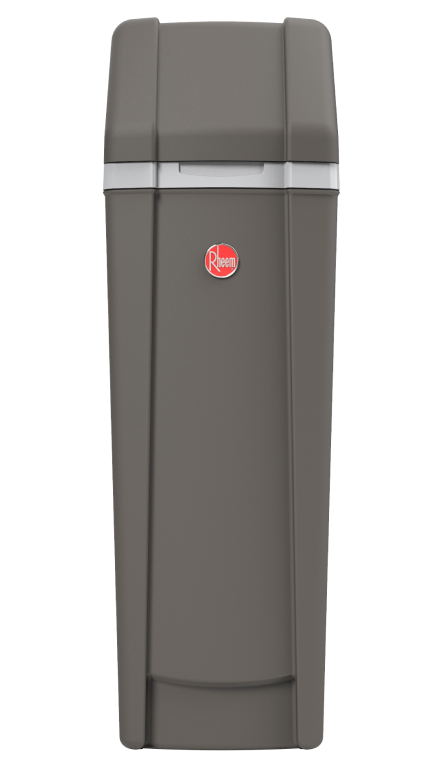
The Rheem Preferred Platinum Water Softener is a heavyweight contender designed for larger households dealing with severe hard water challenges. Let’s explore its specifications, key features, pros, and cons.
Specifications:
Capacity (Grains): Up to 64,000
Flow Rate (GPM – Gallons Per Minute): 12
Dimensions (inches): 22 x 49 x 13
Key Features:
High Capacity: With an impressive 64,000-grain capacity, the Preferred Platinum tackles severe hard water issues effectively, providing a continuous supply of softened water.
Robust Flow Rate: The 12 GPM flow rate ensures quick and efficient water softening, making it suitable for larger households with substantial water consumption.
Extended Dimensions: The larger size accommodates the increased capacity and flow rate, making it an ideal solution for spacious homes.
Pros:
Severe Hard Water Solution: The Preferred Platinum is well-equipped to handle severe hard water challenges, making it a reliable choice for households with demanding water quality needs.
High Flow Rate: The 12 GPM flow rate ensures a consistent supply of softened water, catering to the needs of larger families with multiple water outlets.
Extended Warranty: Rheem’s warranty coverage adds an extra layer of assurance, providing peace of mind for users concerned about potential issues.
Cons:
Space Considerations: The larger dimensions may pose challenges for installation in homes with limited space, requiring thoughtful planning.
Higher Price Point: While the performance is commendable, the Preferred Platinum comes at a higher price, making it a more substantial investment.
Final Verdict:
The Rheem Preferred Platinum Water Softener is a powerhouse solution for households facing severe hard water challenges. With an impressive capacity and flow rate, it ensures efficient water softening for larger families.
While the higher price tag should be considered, the performance and extended warranty make the Preferred Platinum a worthwhile investment for those seeking a top-tier water softening solution.
4. Rheem Preferred Compact Water Softener
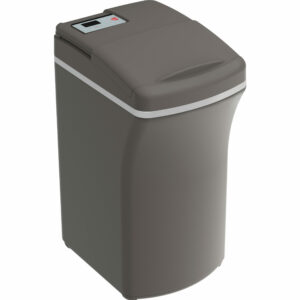
The Rheem Preferred Compact Water Softener caters to homes with limited space, providing a space-efficient solution without compromising on performance. Let’s explore its specifications, key features, pros, and cons.
Specifications:
Capacity (Grains): Up to 31,000
Flow Rate (GPM – Gallons Per Minute): 8
Dimensions (inches): 18 x 21 x 44
Key Features:
Compact Design: The Preferred Compact is designed to fit into tight spaces, making it an ideal solution for apartments or homes with limited installation areas.
Moderate Capacity: With a capacity of up to 31,000 grains, it effectively addresses moderate hard water challenges, making it suitable for smaller households.
Balanced Flow Rate: The 8 GPM flow rate ensures a steady supply of softened water for day-to-day use.
Pros:
Space Efficiency: The compact design allows for installation in tight spaces, providing flexibility for homeowners with limited room.
Affordable Option: The Preferred Compact offers a budget-friendly solution for those looking to improve water quality without overspending.
Easy Installation: The smaller size contributes to easier installation, even for those with minimal plumbing experience.
Cons:
Limited Capacity: The 31,000-grain capacity may be insufficient for larger households facing more significant water hardness challenges.
Lower Flow Rate: The 8 GPM flow rate, while suitable for average water consumption, may be limiting for homes with higher demands.
Final Verdict:
The Rheem Preferred Compact Water Softener is a practical choice for homeowners seeking an affordable, space-efficient solution to moderate hard water challenges. Its compact design and reasonable capacity make it ideal for apartments or smaller residences.
However, for those with larger households or more severe water hardness issues, exploring higher-capacity models within the Rheem lineup may be necessary.
What Stands Out with Rheem Water Softeners?
The Rheem Manufacturing Company water softeners boast several standout features that make them a compelling choice for consumers seeking efficient water treatment solutions. Let’s explore what sets them apart:
Competitive Pricing
Affordable Price: One of the most appealing aspects of Rheem water softeners is their affordability. Despite offering quality water softening solutions, Rheem models come at competitive price points. This affordability makes them accessible to a wide range of households looking to improve water quality without breaking the bank.
Abundance of Practical Features
Numerous Useful Features: Rheem water softeners come equipped with an array of practical features that enhance user experience. From programmable settings that allow customization of regeneration cycles to user-friendly LCD displays providing easy-to-understand information, these features make operation and maintenance hassle-free. Additionally, some models offer leak detection and automatic shut-off, providing added peace of mind.
Dual Functionality: Iron Reduction
Also Reduces Iron: Apart from softening water, Rheem water softeners excel in addressing iron-related issues. They’re engineered to reduce iron content in water, ensuring a comprehensive water treatment solution. This dual functionality sets Rheem apart, as it tackles multiple water quality concerns in one go, providing users with cleaner and healthier water.
Comprehensive Warranty Coverage
Warranty For All Models: Rheem stands by the reliability of its water softeners by offering warranty coverage across all models. This inclusive warranty ensures that consumers have protection against unforeseen issues or malfunctions. Having a warranty provides peace of mind and reinforces the brand’s commitment to quality and customer satisfaction.
Overall, Rheem water softeners combine affordability, practical features, dual functionality, and comprehensive warranty coverage, making them a reliable and cost-effective choice for addressing water quality issues in homes.
Considerations with Rheem Water Softening Systems
While Rheem water softeners offer a range of benefits, it’s essential to consider potential drawbacks that might influence your decision-making process. Here are some points to keep in mind:
Limited Excitement in Upgrades
The “Upgrades” Aren’t Very Exciting: When looking to move up the Rheem water softener hierarchy, the higher-tier models may not bring significant excitement in terms of innovative features.
While the baseline models perform admirably, those seeking cutting-edge technology or advanced functionalities might find the upgrades less thrilling compared to some competitors.
Room for Improvement in Warranty
The Warranty Isn’t The Best: While Rheem provides warranty coverage for its water softeners, it might not be as extensive or comprehensive as some consumers desire. It’s crucial to carefully review the warranty terms and conditions to ensure it aligns with your expectations and provides sufficient coverage for potential issues.
Lack of Salt-Free Alternatives
No Salt-Free Alternatives: For environmentally conscious consumers or those seeking alternatives to salt-based water softeners, Rheem currently doesn’t offer salt-free options. This limitation might be a consideration for individuals looking for water softening solutions that don’t involve the use of salt.
Durability Concerns
Questionable Durability: Some user reviews and feedback suggest concerns about the long-term durability of Rheem water softener systems. While the brand provides warranty coverage, users may encounter issues that raise questions about the overall robustness and longevity of the units.
Thoroughly researching user experiences and considering customer feedback can help make an informed decision regarding the system’s durability.
In conclusion, while Rheem water softeners offer notable advantages, potential setbacks include less exciting upgrades, a room for improvement in warranty coverage, the absence of salt-free alternatives, and reported durability concerns.
Careful consideration of these factors in alignment with your specific needs and preferences will guide you toward the most suitable water softening solution for your home.
Our Evaluation & Noteworthy Alternatives
After a comprehensive review of Rheem water softeners, let’s share our assessment and explore alternative options that might align more closely with specific needs.
Our Assessment
Rheem water softeners stand out for their affordability, practical features, and dual functionality in addressing iron issues. These models cater to various household sizes and levels of water hardness, providing cost-effective solutions for improving soft water quality.
However, considerations such as less exciting upgrades in higher-tier models, potential limitations in warranty coverage, the absence of salt-free alternatives, and reported durability concerns should be taken into account.
Rheem is an excellent choice for those seeking a balance between performance and budget, but individuals desiring cutting-edge features or alternative water softening methods may find other brands more fitting.
Noteworthy Water Softener System Alternatives
For those exploring alternatives beyond Rheem, here are a couple of standout options:
Fleck Water Softeners: Renowned for their reliability and advanced technology, Fleck water softeners offer a range of models with innovative features. They are well-regarded for their efficiency and customization options.
EcoPure Salt-Free Water Softeners: For environmentally conscious consumers or those avoiding salt-based systems, EcoPure provides effective salt-free water softeners. These systems utilize alternative technologies to reduce water hardness without the use of salt.
Frequently Asked Questions (FAQ)
To address common queries and provide additional clarity, here’s a list of frequently asked questions regarding water softening system:
Who Manufactures Rheem Water Softeners?
The production of Rheem water softeners is carried out by Rheem Manufacturing Company, a privately-owned company based in the United States, renowned for its specialization in the manufacturing of water heaters and boilers.
Can water softeners handle well water?
Yes, many water softeners, including those from Rheem, are designed to handle well water, addressing concerns such as iron and hardness.
How often should I add salt to my water softener?
The frequency of adding salt depends on water usage and the specific softener model, but typically it’s done every 4-6 weeks.
Are there salt-free alternatives available?
Yes, certain brands like EcoPure offer salt-free water softeners, providing an eco-friendly alternative to traditional water softeners (salt based).
